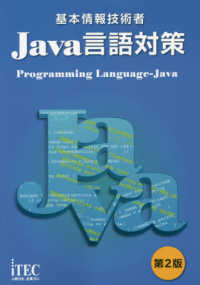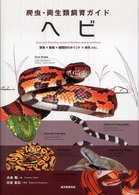- ホーム
- > 洋書
- > 英文書
- > Religion / Ethics
Full Description
This book explores a number of concepts of God in Vaiṣṇavism, which is commonly referred to as one of the great Hindu monotheistic traditions. By addressing the question of what attributes God possesses according to particular Vaiṣṇava textual sources and traditions, the book locates these concepts within a global philosophical framework.
The book is divided into two parts. The first part, God in Vaiṣṇava Texts, deals with concepts of God found in some of the more prominent canonical Vaiṣṇava texts: the Bhagavad-Gītā, the Bhagavata-Purāṇa, the Jayākhya-Saṃhitā as representative of the Pāñcarātras, and the Mahābhārata. The second part, God in Vaiṣṇava Traditions, addresses concepts of God found in several Vaiṣṇava traditions and their respective key theologians. In addition to the Āḻvārs, the five traditional Vaiṣṇava schools—the Śrī Vaiṣṇava tradition, the Madhva tradition, the Nimbārka tradition, the Puṣṭimārga tradition, and the Caitanya Vaiṣṇava tradition—and two contemporary ones—those of Ramakrishna (who has Vaiṣṇava leanings) and Swami Bhaktivedanta—are considered.
The book combines normative, critical, and descriptive elements. Some chapters are philosophical in nature, and others are more descriptive. Each unpacks a specific Vaiṣṇava concept of God for future philosophical analysis and critique. Written by experts who break new ground in this presentation and representation of the diversity of Vaiṣṇava texts and traditions, the book provides approaches that reflect the amount of philosophical and historical deliberation on the specific issues and divine attributes so far considered in the field of Hindu Studies. This book will be of interest to researchers in disciplines including philosophy of religion and Indian philosophy, cross-cultural and comparative philosophy, analytic philosophy of religion, Hindu Studies, theology, and religious studies.
Contents
1. Introduction; 2. The concept of god in the Bhavaga-Gītā: A panentheistic account; 3. Beauty and form as a corollary of a perfect being: Kṛṣṇa in the Bhāgavata-Purāṇa; 4. The nature of God in the Pāñcarātra with specific reference to the Jayākhya-Saṃhitā; 5. Supreme Self and Supreme Lord: Cosmological monotheism in the Mahābhārata epicr; 6. The Āḻvār concept of God and Tamil Vaiṣṇavism: If we examine, there is but one God! 7. Two conceptions of the relation between self and God: The debate between Śaṅkara and Rāmānuja; 8. In defence of divine transcendence: Madhva's critique of 'material panentheism'; 9. Non-theism and theism in the Nimbārka Sampradāya; 10. Embodiment and abstraction: God in Puṣṭimārga; 11. On śaktis and their divine possessor: Towards a Gauḍīya Vaiṣṇava concept of God; 12. Harmonising the personal God with the impersonal Brahman: Sri Ramakrishna's Vijñāna Vedānta in dialogue with Gauḍīya Vaiṣṇavism; 13. The God of yoga: Bhaktivedanta Swami Prabhupāda and divine pedagogy addressing divine hiddenness; Index





